Think SMALL

I imagine this sight would be very daunting to an ant as she climbs up this lofty tree. It must seem like an impossible journey.
Do you ever feel like an ant? Where you feel so small, and everything around you seems so large and overwhelming? The tasks you must complete are too complex and too many to count? The knowledge you currently possess feels grossly inadequate? Yeah, me too.
Similar feelings can happen when reality sets in after the doctor gives you a gluten-related disorder diagnosis. You now have an answer for your sickness, but it sets off a rapid-fire chain reaction of questions. What is gluten? What can I eat? What can't I eat? How will I manage work and social functions? What if I don't feel better? What will friends and family think of me? The questions keep coming, and the meltdown begins.
After my Father-In-Law passed away in 2010, we needed to clean out his garage and shop. He was an electrician but also performed home renovation projects. Over his lifetime, he accumulated a lot of "stuff." I saw stuff stacked on stuff, piled on...more stuff. My gosh, where do I start?
"Pick one and look at the others," came down from the heavens. This phrase was my Father-In-Law's advice when deciding upon a card to throw down while playing the card game Sheepshead. Thanks, Lester! Okay, I'll pick one area of the shop and work it until it's clean. Rinse and repeat to the tune of almost 20,000 steps to the dumpster. Whew, I survived Day #1.
A journey of a thousand miles begins with a single step
Let's say you have a goal of running a marathon. Going from the couch to 26.2 miles in one day will bring on a world of hurt. You're setting yourself up for failure before you start. Just getting around the block will be an accomplishment. After the first 100 yards, it'll feel like you're suffering a myocardial infarction (you might be after logging all those extensive couch miles). Out of breath and clutching your chest, you'll say, "
Sometimes seeing the expanse of the big picture is paralyzing. There's so much for the brain to process. Out of frustration, you shut down; you lose focus, you lose motivation. Finally, you give up.
Do. Or do not. There is no try.
When it comes to being gluten-free, giving up is not an option - not if the goal is to rebuild your life and health. What if we approach this gluten-free journey differently? What if we narrow our focus and think small?
But how can we achieve this goal by thinking small?
It is the small changes you make that will add up to something bigger. But in this case, small doesn’t mean easy. It requires focus, dedication and effort that, over time, will start to pay off.
When you take a trip, you fire up your GPS app. To start the journey, you enter the destination. After pressing Go, you follow the turn-by-turn directions the GPS feeds you. Your focus is on executing that one command. Then you wait for the next direction, the next lane change, the next turn, the next exit, the next gluten-free snack. [Gotta eat on a road trip, right? Remember to pack your gluten-free cooler!] One-by-one, you reach your journey's way-posts. Before you know it, the destination is on your left. I think you can see where we're going with this.
Do not sell yourself short - you can rock this. When you have a long-range goal in mind, like executing a gluten-free lifestyle, map out a plan to get you there. The key is breaking it into small, manageable goals. How small? Things you can easily accomplish monthly, weekly, daily, hourly, or by the minute if need be. Each breath, each thought, each action brings you closer. Those small successes may not seem like much. Yet, they compound to build the motivation, confidence, and momentum required to propel you forward.
Andy Stumpf, a retired Navy SEAL and SEAL instructor with a decorated 17-year military history asked SEAL candidates why they quit during their training. He discovered they were often overwhelmed even though they had lifelong goals to be an elite SEAL. Stumpf maintains they didn't keep their world small enough.
Stumpf suggests, "Don't look at Hell Week as a five-day pipeline. Just make it to your next meal, because they have to feed you every six hours. Get to the next meal, get a mental reset, and keep stacking those six hours segments. If you apply that resilience and approach to your goals, you can accomplish an insane amount."
This concept is pure brilliance! So many situations can benefit by using this mind-set. I use it almost daily. If it can get someone through SEAL training, it can make you successful in executing the gluten-free lifestyle and beyond.
There is only one way to eat an elephant, one bite at a time.
Desmond Tutu puts an elegant spin on an African proverb on dealing with an elephant in your path. There is no question about it; transitioning to gluten-free is a big elephant in your way, but you can handle it, one step at a time! The Gluten Intolerance Group has an outstanding how-to guide.
"Getting Started on a Gluten-Free Diet: A Step-by-Step Guide” consists of these five basic steps:
Step 1: Learn What Foods to Include or Avoid
Step 2: Carefully Read Food Labels
Step 3: Explore Gluten-Free Goods
Step 4: Watch Out for Cross-Contact with Gluten
Step 5: Join a GIG Support Group
To learn more, read the article: http://bit.ly/GIG-GF-StepByStep
Gluten-Free Success
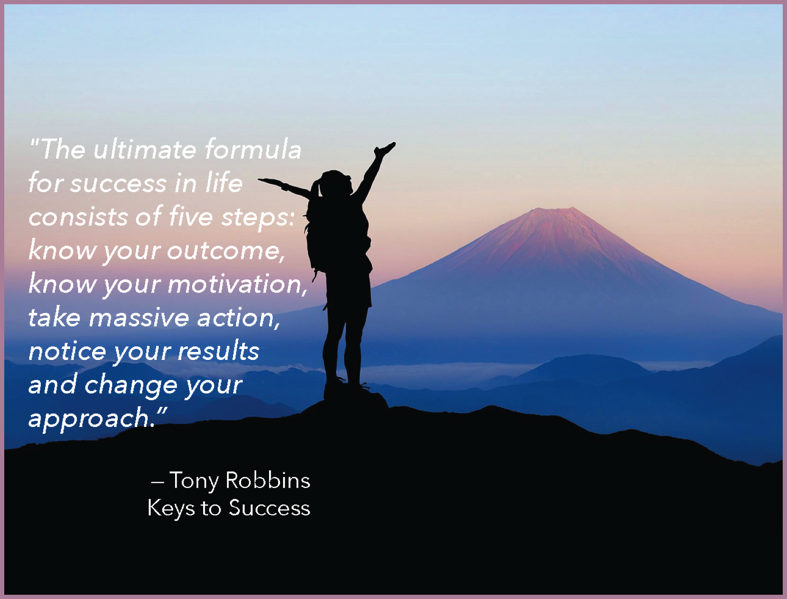
This is a companion article to “The Stages of Change: Gluten-Free Edition.” I started out writing Gluten-Free Success, but a quote from Vishwas Chavan sent me down a rabbit hole about how we process and deal with change. Thank you for riding along with me on this trip.
Al Klapperich
How can we even begin to think about success when we're wondering how to survive breakfast?
If you hadn't heard of Tony Robbins, he's is a motivational speaker, author, and famous life coach. I find his formula for success straightforward and commonsensical. I like that. I'm all about being sensibly gluten-free.
While it may happen to some, most people don't blindly stumble into success - particularly with something significant like a lifestyle change. It usually requires some conscious effort - "massive action" as Mr. Robbins calls it.
Let's look at Mr. Robbin's formula and see how it can help create a successful gluten-free life.
Know your outcome
There are many definitions of success, but the best one is the one you've created for yourself. Success is unique - as individual as a fingerprint. One person’s success may be another person’s failure. Whether a newbie or a pro at the gluten-free lifestyle, ask yourself, "What does my success look like?" Let your answer be your guide.
If you've been suffering from an undiagnosed gluten-related disorder, you probably know your outcome already.
“I want to recapture my health and start a new life.”
An excellent long-term success goal, but don't forget to develop a roadmap - a plan to get there.
In "Springboard: Launching Your Personal Search for Success," G. Richard Shell, says, “success is not a static, one-and-done process. It’s dynamic. If you stay in motion, learn as you go, and remain open to the insights you gain on the journey, good things often follow.”
Gluten-free success may be different depending on the day, the hour, or even by the minute. That split moment decision to pass up that piece of gluten-filled birthday cake, the time spent learning what gluten is, or becoming a label reader and finding hidden gluten, helping someone in the gluten-free aisle at the grocery store are all great examples of success. On the surface, some of them might seem insignificant to us, but if we examine them closely, they are important milestones. Those successes add up and contribute to our long-term success goal.
It’s the little details that are vital. Little things make big things happen
Know your motivation
Motiviation is "The Why You Do it". That little voice inside you - sometimes whispering - other times SCREAMING that you can do it. Knowing what pushes you forward enables you to be more effective in attaining your success. For many, the motivation is a better life without the constant pain and suffering. For some, it's centered around loved ones - having the ability to fully present for them. For others, it's the opportunity to help others. Spend some time figuring out what gets your mojo working...and keep working it.
Transitioning to the gluten-free lifestyle is filled with numerous distractions; things that will pull you into the weeds. Friends and family members who offer gluten-filled foods, "Donut Day" at work, birthday celebrations, family gatherings, holiday parties. These are just a few events where temptation is present.
Enter stage left - discipline. Discipline is "The What You Do." It's the ability to analyze a situation and make corrections in your behavior. Discipline keeps you on the "straight and narrow"; preventing you from eating that [gluten-filled] donut or giving into friends and family members' offerings. Motivation and discipline work together. When the motivational inspiration wanes, discipline swoops in to save the day.
It's true, you will experience low-motivational days. Probably more than you want, but this is normal. Expect it and prepare for it. Mental preparation will help get you through; stay positive. By focusing on those small (minute-by-minute, day-by-day) successes, you will help raise your motivational energy levels.
There will be obstacles. There will be doubters. There will be mistakes. But with hard work, there are no limits.
Take Massive Action
Making a lifestyle change is no small feat. You're re-wiring years [decades] of behaviors and habits. Unlearning your old way of life and replacing it with a brand new one requires a lot of hard work, dedication, and commitment. You've probably noticed the use of the word "lifestyle" instead of "diet." Changing what you eat is only one component. This change will affect every facet of your life from here on out. Convenience – gone. Care-free dining – adios. The joy of family gatherings - replaced with dread and worry. Things that took little or no thought - now rivals the logistics of a Mars Rover launch. Yes, it will require massive action.
A few examples of massive action in the gluten-free lifestyle.
Making the 24x7x365 commitment to gluten-freedom. There are no vacations, no breaks, no “just this once" cheats. Constant vigilance is required. Gluten never sleeps.
Educate yourself about gluten - what is it, learn where and how to find it.
Determine if you can have a gluten-free house. Many variables to consider. Choose what's best for you and your family.
Clean your house from top to bottom. Crumbs matter. Either throw out all the gluten [and gluten-contaminated items] for gluten-free household or arrange [segregate] gluten-free/gluten products accordingly. Setup gluten-free safe zones and develop cross-contact policies and procedures [and make sure household members abide by them].
Educate your friends and family members. Depending on the family this task may be more Sisyphean than Herculean, but it needs to be done.
Join and participate in a support group. Local face-to-face groups are best, but online groups can be beneficial too.
Notice your results and change your approach
The key word in this step is "change." Change isn't always linear with clearly defined starting and stopping points; it's an on-going, evolving process.
Due to the complexity of this lifestyle, you will be making some mistakes in the beginning. Everyone does, it's all part of the process. You didn't go from crawling to walking without a few falls. Don't let these events derail your efforts. Get up, dust yourself off, and try again. Resiliency and adaptivity will take you far on your journey toward gluten-free success.
The important take away here: learn from your mistakes. If you don't you will be spinning your wheels; expending a lot of energy but going nowhere - fast.
When something didn't work out as you expected, or you are not feeling well, take time to analyze what has been happening, why it's happening, and how you can prevent it in the future. Yes, you have to become a "Gluten Detective." Perhaps you've switch products because the store stopped carrying your first choice? Maybe the french fries you ordered at the restaurant were fried in the same fryer as the gluten-full items? What about overlooking gluten in a product's ingredient list?
Only those who are able to adapt to changing scenarios will continue to survive and prosper. Success is directly proportional to the degree of positive adaptation to change.
I understand that our health may not always be under our direct control, but I also know that before tackling any challenge, we must first prepare ourselves mentally. Hopefully, the information presented here and in the Stages of Change article will help increase your knowledge, grow your confidence, and elevate your capacity to manage the jumble of emotions you'll experience on this gluten-free journey.
Here’s to your success! Cheers!
The Stages of Change - GF Edition
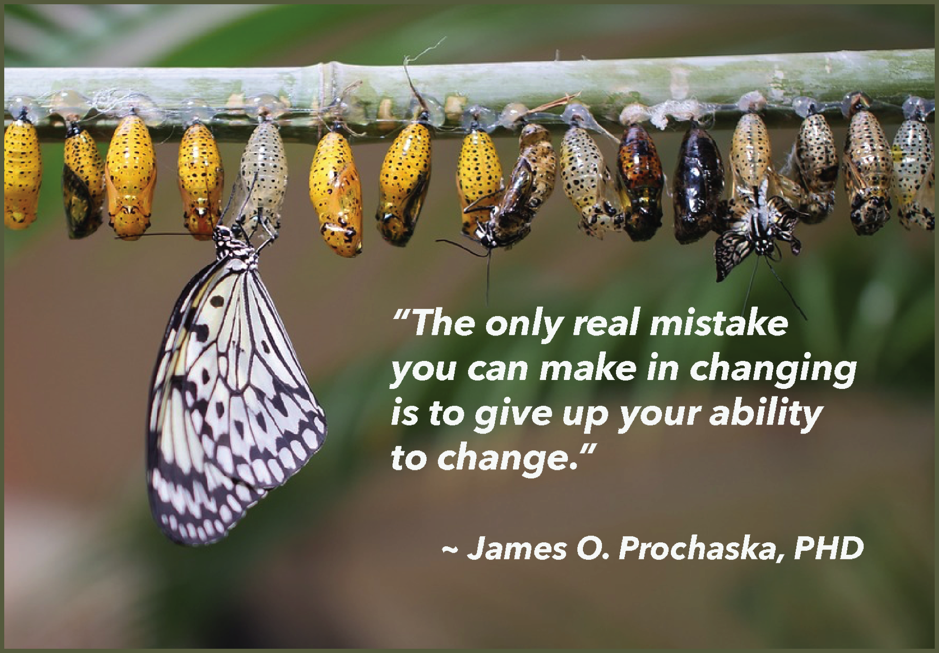
This is a companion article to “Gluten-Free Success.” I started out writing Gluten-Free Success, but a quote from Vishwas Chavan sent me down a rabbit hole. That trip resulted in this article. Thanks for riding along.
Al Klapperich
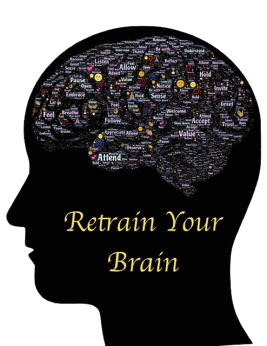
BRAIN: "What's that noise? Why are those bushes rustling? Is it a wild animal getting ready to attack us? DANGER!"
When confronted with change, our brain can't predict the outcome, so it triggers the"flight or fight" response. Faced with uncertainty, we find ourselves distracted, anxious, and fearful. This heightened state decreases decision-making abilities, reduces memory, and elevates anger; not always conducive for clear, thoughtful consideration. The human brain is an astounding organ. Not only does it need to maintain order, but it also manages adaptation. We may not notice it, but our brains are continually changing in response to our ever-changing environment; the scientific name for this process is neuroplasticity. This adaptability enables our species to thrive and survive all kinds of adversities. The trick is to use our innate adaptability to our advantage. However, this metamorphosis requires a lot of effort. When transitioning into the gluten-free lifestyle, there are a lot of changes, unknowns, and unpredictable outcomes. Yes, our brains are going to freak-out. We are replacing old comfortable habits and behaviors with new, unfamiliar ones. Those old behaviors have become almost automatic; requiring little to no thinking. We have had a lifetime to build those neural pathways in our brains.
Neural pathwhats? The pathways along which information travels through the nerve cells of the brain. When we say or do things repeatedly, that information in our brain travels the same path. Think about a hiking trail in the woods - as the path receives more traffic, it becomes better defined, well worn and effort-less to travel - the same thing happens in our brains. When we start our gluten-free lives, we are blazing new pathways. This requires us to be conscious, and purposeful in our efforts.
Over the years, scientists and mental health care professionals have developed many thoughts and theories about the brain, the process of change, and human behavior. Of the many behavioral change models that exist, the most prevalent are Learning Theories, Social Cognitive Theory, Theories of Reasoned Action and Planned Behaviour, Transtheoretical Model of Behavior Change, The Health Action Process Approach and the BJ Fogg Model of Behavior Change. Each model has its own set of strengths and weaknesses. That's not something we'll be discussing here. We will be exploring the Transtheoretical Model of Behavior Change (TTM) - also known as The Stages of Change. I chose this method because it made sense to me, it seemed logical and fit my personality and way of thinking. Will it be a fit for you? I don't know the answer, but keep reading you might be surprised.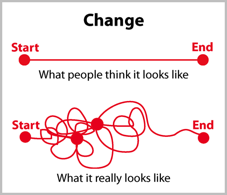
- The Stages of Change - when change occurs.
- Pre-Contemplation: No action for six months.
- Contemplation: Intention to act within six months.
- Preparation: Intention to act within 30 days
- Action: Experiencing change for less than six months.
- Maintenance: Experiencing change for more than six months.
- Decisional Balance (Pros & Cons) - why we change.
- Weigh the Pros (advantages) and Cons (disadvantages) of changing.
- Pros and Cons are independent of one another. Can be high in one - low in another. High in both, or low in both.
- Pre-Contemplation stage - the Cons of changing out-weigh the Pros
- From Pre-Contemplation to Contemplation - the Pros consistently increase
- From Contemplation to Action - the Cons consistently decrease
- Pros begin to outweigh the Cons before we take action.
- The key: double-up the focus on increasing the Pros of changing.
- Self-efficacy (Confidence & Temptation) - confidence to execute change.
- Confidence is low and tends to grow as we progress through the stages. Inversely, temptation lessens.
- We see the biggest jump in confidence in the Action and Maintenance stages
- Confidence and Temptation tend to be balanced during the Action stage.
- The Processes of Change - how change occurs.
- Describes the basic pattern of activity we experience as we process change.
Pre-contemplation
In this stage we do not know we have to change, or we do know, but simply do not want to. When it comes to the effects of gluten, there's a wide spectrum. [This stage casts a wide net over the gluten-free community.] In most cases, people with gluten-related disorders have experienced some ill-health - be it long-term or short-term. We know something is wrong, but haven't been diagnosed or have been misdiagnosed. Maybe we think our state of being is perfectly normal because we've always been that way - our entire family is that way. If we have silent celiac disease [have no symptoms], a diagnosis will catch us completely by surprise. We may have a diagnosed family member urging us to get tested, but we brush them off like a pesky mosquito. In this stage, we don't want to hear that gluten could be a problem for us.
"Give up my bread/pizza/beer? No way, I'd die without it." "Just because you have problems with gluten, doesn't mean that I do." "Bah, my sensitive stomach has nothing to do with gluten." If that sounds like denial, yes, it probably is.
To move past this stage, we must somehow become aware that a problem exists and accept that we must address it. We may come to this realization on our own after we've been given testing results from our healthcare professional, or we finally listen to our family and friends. The mere fact that we are "thinking about it" is forward progress!
Contemplation
This stage finds us realizing the value in making the change; the mental gears have been turning, and we are getting ready. We have thoughts of "Yeah, I get that gluten-free is important" but the key is to personalize them by thinking "I need to be gluten-free." Here we start to acknowledge the problem and take ownership. Our minds are now open to new ideas and information. We may begin asking questions of friends and family who have already gone gluten-free. The trick is discovering the trigger - the event, the person, the emotion, the reason we flip the switch. We begin to explore the possibilities about what we need to do and if it will be worth the effort. These thoughts can be fleeting or last a lifetime. The bottleneck in contemplation is getting stuck in a loop of weighing the benefits against the costs of making the change. We never feel ready to commit. Deep down we know change is needed, but we can't make it happen. To help organize and visualize our thoughts, sit down with a pencil and paper - list all the pros on one side and the cons on the other. When we encounter obstacles, identify ways to overcome them.
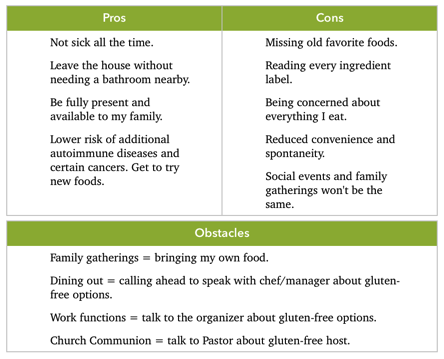
With everything that's going on, our emotions may inspire us to act immediately. Sometimes this causes us to jump right into the Action stage - bypassing one of the most important stages - Preparation. Action without perparation can lead to disaster.
Preparation
We've made the decision to change, now we must figure out how to do it.
SELF: "What do I need to do to prepare myself to make this transformation happen?"
Any successful outcome begins with forethought and planning. We are creating a plan of action; a road-map if you will. Put it in writing, draw pictures with circles and arrows, create a wall-sized vision board, save the plan as your device's wallpaper or desktop picture as a constant reminder - do whatever generates the greatest impact. Begin gathering the tools and resources to help us navigate our gluten-free journey. One of the most effective resources is a local support group; seek out your nearest group - inquire about their meetings (when, where, how often, etc.) - better yet, join and attend a meeting. Start building a library of trusted books and websites. This stage is about building our knowledge and confidence, preparing us for gluten-free success. Think about all the possible ways we cross paths with gluten. Cupboards, pantries, refrigerators, freezers, silverware drawers, cutting boards, toasters, kitchen utensils, counters, medication, hair and personal care products, family gatherings, parties, social functions, restaurants, medical and dental procedures - the list is staggering. All of these things and more need our attention. It's better to have a plan of action so we can be PROactive instead of REactive. Some of our very first actions begin appearing. The key to mastering this stage is a commitment to all the effort, planning, and researching. We must be ready to go all-in. Being "sort of " gluten-free is like being "a little"pregnant.
Action
It's game day! We move from thinking and planning to doing. We've done the risk/benefit analysis and committed to making the leap - we've made a plan, and now it's time to act! It's here where real change starts happening.
We go on a gluten-round up at home - seeking out and removing all sources of gluten. If we can't do a 100% GF house, we gather and store all the gluten in designated areas. Empty and clean out every cabinet and drawer [see all the crumbs in the silverware drawer? YIKES!] Clean the fridge and stove, get a new toaster, cutting boards, and colanders. Join and actively participate in the local support group [if you haven't done so already]; we truly need that face-to-face support. Read the mountain of gluten-free books sitting on the coffee table. By following our initial action plan, we'll be making significant modifications to our routines, environments, our relationships, and of course ourselves. That's the whole idea, right?
As expected, this stage will require every ounce of commitment we can muster. We may find ourselves being pushed and pulled to the very limits. Sadly, some of this stress may come from those closest to us. We need to hold fast to the course we've plotted out; for our own health and wellbeing. If we find ourselves drifting or blown off-course refer back to the plan of action we created. Keep finding acceptable alternatives and focusing on our "cans" instead of "can not's" It's necessary to acknowledge and celebrate the progress and victories along the way - no matter how seemingly insignificant we think they are. Anything that moves us forward toward our goal is a success! We also need to recognize the failures, not to chastise ourselves, but to learn from them. If we know why something happened, we can prevent it from happening in the future.
Maintenance
The maintenance stage is about sustaining the momentum we started in the beginning. At first glance, we think the hardest part of the change process is the initial startup. True it's tough, but maintaining the change long-term is the most challenging part of the process; it's also the most important. At this point, our new lifestyle is on its way to being established, things are starting to become routine. Confidence is increasing. Certain memories of our past lives are starting to fade. Complacency is our enemy because of the possibility of slipping into our old lifestyle may be lurking in the background. Dramatic life events such as a job change, breakdown of a relationship, a death make us vulnerable. These events can beckon us back into our old habits. While our original plan serves us well, we keep optimizing it to address past mistakes and handle any situations we didn't expect at the start. View these challenges as an opportunity to advance your skills, knowledge, and confidence. This continued growth pushes us ever closer to the next stage. Perhaps more work on label reading is needed because small amounts of gluten are slipping below our radar despite our diligence. We didn't think about our church's communion hosts containing gluten. Our high school class reunion is coming up, maybe we could volunteer to be on the planning committee to have a voice in food options.
Pro tip: Get involved in planning activities. This gives us an opportunity educate and make positive changes from the "inside."
Because of our new gluten-free lifestyle, our bodies are adjusting, adapting, and healing - mentally and physically. After gluten reactions subside, we may discover other problematic foods. Of course, this will require additional tweaks to our plan. The diets to obtain optimal health are as unique as our fingerprints. It can take some time resolve additional food sensitivities. As we settle into maintaining our new life, we may struggle with keeping the fire lit; we run the risk of losing the intensity. If we haven't participated in a local support group already, make it a priority. Surrounding ourselves with like-minded individuals can help keep us motivated. Fellow members walk our walk, talk our talk, share the same struggles and joys.
Termination/Adoption
We started out telling ourselves "I can't", then "I might", followed by "I will", "I am", "I am still", and now finally "I have". It's been a long road on our way to change. After spending at least two years in the Maintenance stage, we find ourselves sliding into the Termination/Adoption stage. At this point, we don't have to think so hard about what to do; we know what to do. Our daily activities come to us naturally; they become second nature, almost as automatic as breathing. We have confidence in our knowledge and abilities. Sure, we may miss certain aspects of our former life, but the desire to return to that unhealthy and sickly life has dissipated. Our transformation from gluten-full to gluten-free has come to fruition. Our new life has become our "new normal." We started out as a caterpillar and came out the other side as a butterfly. Well done. A proud moment for sure. This does not mean we stop our personal evolution process! No, we keep moving forward. We look for new and more adventurous goals. Now is the time to dream and plan for things we never thought possible in our former life. Perhaps we have a strong desire to share what we've learned to help others. Starting your own support group or volunteering at your current group is an excellent choice. Maybe we participate more in online discussion boards or Facebook groups. Possibly start our own blog or website. There are many ways to boost our gluten-free advocacy to the next level. Maybe your new goals have nothing to do with gluten. Perhaps you want to train for that 5K, 10K, or Half Marathon you've always wanted to do? What about music or voice lessons? Now would be a great time to start that writing project. The possibilities are only limited by your imagination. Prochaska estimates only about 15 to 20 percent of the people make it to this stage. If you find yourself falling back into previous stages, don't panic. Be gentle with yourself. Figure what stage you're in - go back to your game plan, see if it needs a bit of tweaking and renew your commitment to moving forward. Ask for help. Never give up.
Relapse/Lapse
Not an official stage of Prochaska and Di Clemente's model but some valuable insights can be learned here. Note: Repeated gluten exposure is a serious health risk for those with a gluten-related disorder. There is an important difference between relapse and lapse (also known as a slip). A lapse or slip is a rare, quick and temporary return to the behavior/lifestyle we've been trying to leave behind.
Example: while attending a birthday party, we have a piece of gluten birthday cake.
A relapse is a complete and total return.
Example: we tell ourselves the gluten-free lifestyle is too hard and go back to eating gluten.
Gluten is so pervasive in our society, no matter how hard we try, we will likely be faced with a gluten exposure at some point. We must be prepared and know how to deal with the inevitable. For this article, I am defining a relapse/lapse as any gluten exposure - be it blatant cheating or inadvertent/accidental. Over the years, I've crossed paths with far too many people with celiac disease and non-celiac gluten/wheat sensitivity who willingly and knowingly cheat. Of course, they have their "justifications," but in the long-run, they are cheating themselves, and their loved ones. If you're new to the gluten-free lifestyle, I'll be crystal clear - cheating is not an option for those with a gluten-related disorder. Accidental/incidental exposure is different from blatant cheating. Regardless of how or why we consume gluten - the damage is the same; the difference here is the intent. We must be mindful of these mishaps, so we do not continually repeat them. If we peel back the layers, there's probably a fine line between repeated accidental/incidental exposures and cheating. To be caught by surprise the first time is understandable, but if the same situation happens repeatedly - it shouldn’t be - we need to take a closer look at what’s going on.
GIG of ECW's "The Risks of Cheating" looks at the complications from repeated gluten exposures. bit.ly/GIGECW_Cheating
While we may not like visiting this stage, it can be beneficial to our overall success. It's important to view relapses/lapses not as failures, but rather another stage on our way to success. If we believe this set back is a failure, we're at risk of creating a self-fulfilling prophecy - undermining our efforts and making it easier to regress to our glutenous ways. Lapses reinforce our need to be completely gluten-free. Once we start feeling better, we might doubt gluten's role in our poor health. While having that piece of pizza when hanging out friends seemed like a good idea at the time, we are sorely and swiftly reminded why we began this transformation. We learn about resilience and persistence. When we are knocked down, we get back up and keep moving forward. Why? Because we deserve a better life and won't stop until we attain it. Because our friends and family deserve a better "us." Never give up.
"Courage does not always roar. Sometimes courage is the quiet voice at the end of the day saying, 'I will try again tomorrow." ― Mary Anne Radmacher
Ten Processes of Change The stages of change tell us what happens when we experience changes in thinking, emotion, and behavior, but the processes of change show us how the changes come to be. The implementation of these cognitive and behavioral activities are used to advance through the stages successfully. The processes are divided into two sections - Experiential and Behavioral. The experiential processes use increase over time and peaks in the contemplation or preparation stage and decrease in the action and maintenance stages. The behavioral processes are used most in the action and maintenance stages. This makes a lot of sense - first, we change our thinking, then we change our behavior.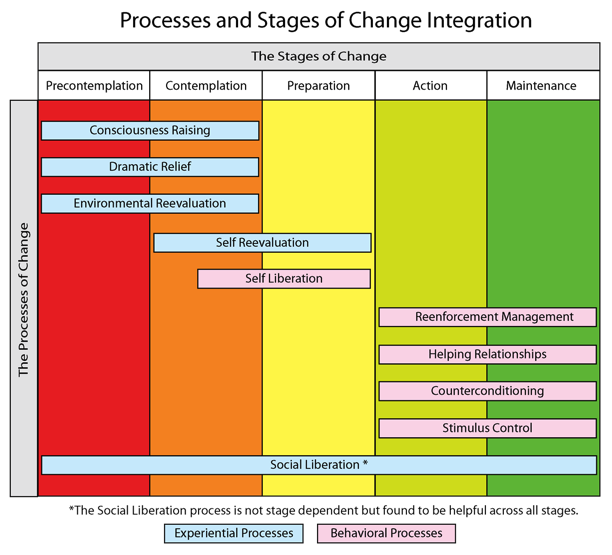
1. Consciousness Raising [Increasing awareness] - Experiential
Family members, medical professionals are telling us about our gluten intolerance and our need to be gluten-free. We start gathering information to get a better understanding of the new behavior required to remove gluten. "I recall information people have given me about gluten and gluten-related disorders."
2. Dramatic Relief [Emotional arousal] - ExperientialThe information we are receiving is concerning to us. We start to feel uncomfortable or possibly frightened. Maybe there's really something to this? "I react emotionally to warnings about gluten and gluten-related disorders. Grandma died from a stomach-related illness, no one really knew what it was. Could it have been celiac disease and she didn't know it? If I don't go gluten-free will the same thing happen to me?"
3. Environmental Reevaluation [Social reappraisal] - ExperientialWe're realizing our behavior is affecting those around us. The effect may be positive or negative depending on our choice. "I realize that if I continue to eat gluten and remain sick, I won't be able to care for my children. By being gluten-free, I am able to fully participate in life instead of watching it from the sidelines."
4. Self Reevaluation [Self-reappraisal] - ExperientialWe begin to look inward and assess how our gluten-free lifestyle is affecting us. We take note of how we are feeling physically and emotionally "I feel so much better when I'm gluten-free both physically and emotionally. I know I must remain so for life. When I cheat, I am disappointed in myself for putting my health and my family at risk."
5. Social Liberation [Environmental opportunities] - ExperientialAs we delve deeper into the gluten-free lifestyle, we find more people are aware of gluten-related disorders than we first expected. Grocery stores have dedicated aisles for gluten-free products. Select restaurants, bakeries, hotels, resorts, etc. have gluten-free offerings or specifically cater to the gluten-free community. [Note: Awareness of gluten and gluten-related disorders is growing. It's better than it used to be, but still has a long way to go.] "I find mainstream awareness is making it easier to be gluten-free. Family members who have been gluten-free for years tell me it's much easier to be gluten-free today than it was five or ten years ago."
6. Stimulus Control [Re-engineering] - BehavioralBy removing gluten from our homes [or at least moving and re-arranging it], we begin the mental re-wiring process. If gluten isn't there, we won't be tempted to eat it. Instead, we replace it with healthy, gluten-free alternatives "Whew! I feel more comfortable in my home now that gluten has been removed or sequestered. I'm also learning how to cope with gluten in situations where I don't have complete control [workplace, public venues, etc.]."
7. Helping Relationship [Supporting] - BehavioralHaving support is crucial to a successful transition. We need trusted individuals who are caring, compassionate, and willing to simply listen. "I have a spouse/friend/family member who is tremendously supportive. Always willing to listen and be my gluten-free champion." "My spouse/family members are horrible. They are unsupportive and at times overtly try to derail my efforts. Thank goodness for friends and my local support group members. They understand - they 'get it' - they keep me sane."
8. Counter Conditioning [Substituting] - BehavioralGrabbing a snack or something to eat can be one of those "autopilot" type actions. It's easy to snag a bag of chips, a cookie, or candy as we walk past it. Instead of stocking our kitchens with glutenous foods we supply it with healthy, gluten-free alternatives. We must be mindful, in today's gluten-free environment it's easy to swap out processed crappy glutenous foods with processed crappy gluten-free foods. Now is the time to make better choices - fresh fruits, veggies & gluten-free hummus, walnuts, almonds, cashews, hard-boiled eggs, high-quality gluten-free dark chocolate (Endangered Species Chocolate Bars). "I wasn't sure about it at first, but I find myself genuinely liking veggies and hummus as a snack."
9. Reinforcement Management [Rewarding] - BehavioralReinforcement Management renders consequences based on decisions and actions. While reinforcement can include the use of penalties, rewards tend to yield better results over punishments. A combination of cognitive and behavioral reinforcements, positive self-statements, and external recognition reinforce positive behavior and increase the likelihood of repeated positive behavior. While gluten-free treat food may seem like a reasonable reward option, it's not recommended to use any food as a reward (or punishment). Suggestions: Guilt-free "You Time," massage - mani/pedicure, a movie, museum trip, shopping trip, ballgame. "I really rocked it this week. My skills, knowledge, and confidence are growing. I found a gluten-free labeled food containing barley due to my label reading skills. I alerted the appropriate parties. My family and friends are noticing and praising me. I think I'll purchase that Wusthof Chef's knife, I've been eyeing up."
10. Self Liberation [Committing] - BehavioralWe believe change is needed and commit to making that change. "I can no longer ignore the facts. I have come to realize that I can and must be gluten-free. I know that it will not be easy, but I am ready to make the change for myself and loved ones."
James O. Prochaska, PHD
http://bit.ly/2BYGRuE
“James O. Prochaska is Director of Cancer Prevention Research Center and Professor of Clinical and Health Psychology at the University of Rhode Island. He is the author of over 400 publications, including three books, Changing for Good, Systems of Psychotherapy and The Transtheoretical Approach. He is internationally recognized for his work as a developer of the stage model of behavior change.”
Detailed Overview of the Transtheoretical Model
(Stages of Change)
http://bit.ly/2MCHnTR
ExperienceLife.com
“The Stages of Change”
By Jessie Sholl
http://bit.ly/2okF5dE
PsychCentral.com “Stages of Change”
By Mark S. Gold, MD
http://bit.ly/2LF8zwc
AConsciousRethink.com
“The 5 Stages Of Change Required To Make New Behaviors Stick For Good”
By Katie Uniacke
http://bit.ly/2NtydW8